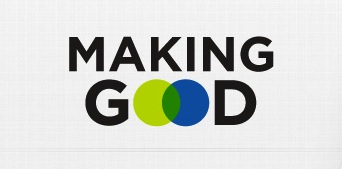Making Good: Finding Work That Is Meaningful
by Wen Lee | April 11, 2012

Many Americans feel like they have to choose between meaningful work and making money.
This is especially true for young college graduates, many of whom leave school excited to make a difference in the world but then struggle to apply their talents gainfully. Whereas 8.5 percent of Americans overall are out of work, unemployment among new grads is as high as 54 percent. If they are lucky enough to find a job that pays well, it is usually less satisfying and doesn’t fulfill their deep desire to “make good” in the world.
Which leads one to wonder: Is it possible to have a meaningful career and make money at the same time?
According to Billy Parish and Dev Aujla, the answer is yes. The pair’s new book, Making Good: Finding Meaning, Money, and Community in a Changing World, has been dubbed “the What Color Is Your Parachute? for the Facebook generation.” Making Good, which came out in February, encourages young people everywhere to rethink, reimagine, and rebuild the world—while also achieving financial autonomy.
Parish and Aujla are young entrepreneurs who have successfully built social enterprises despite the volatile economy. Parish co-founded the Energy Action Coalition in his early twenties, which grew into one of the world’s largest youth-led groups fighting climate change. He is also the co-founder and president of Solar Mosaic, an online crowdfunding platform that helps everyday people invest in solar projects in their communities. Aujla is the founder of DreamNow, a charitable organization that works with young people to develop, fund, and implement social change projects. He has also worked for companies like GOOD.is and Change.org.
Rebuilding Community
In Making Good, Parish and Aujla argue that “good” entrepreneurs are desperately needed in today’s society. As they explain, “Virtually every current system that supports our daily lives—healthcare, banking, energy, food, you name it—was created decades, sometimes centuries, ago and hasn’t been updated to account for so many developments in the modern world.... Today every system can be rebuilt in a way that actually makes sense for people, for profit, and for the world.”
The authors encourage young people to identify a need in their community—whether it’s access to renewable energy, support for social justice, or the production of organic food—and use creativity, innovation, and entrepreneurship to fill that need. Building a new system, they contend, will create jobs. “This rebuilding...is the answer to making money and changing the world.... Rebuilding is about action. Work.”
Making Good observes that the current trend is a return to "whole communities" after decades of big-box store domination and the breakdown of local economies. Such communities are dense, walkable, and filled with restaurants, gardens, local shops, schools, and community gathering spaces. Not only do whole communities increase resiliency, collaboration, and happiness, they also offer big opportunities for entrepreneurs looking to make good.
In Providence, Rhode Island, two local artists repurposed an abandoned factory into a bustling community center with art studios, architectural offices, youth programs, and ironworking sessions. In the South Bronx in New York City, ReBuilders Source was launched in 2008 as a worker-owned business that takes salvaged building materials otherwise headed for the landfill and resells them to the local community.
To help rebuild your community, the authors suggest asking some key questions: Where has this place been? Where is it headed? What could it be? Community by community and project by project, they say, a new self-sustaining economy will emerge.
Choosing Passion Over Profit
At the same time, Parish and Aujla caution about the desire to make money. The point of money, they say, is not to maximize profits but to fulfill everyday needs: “There’s evidence that suggests once we have enough money to comfortably cover a middle-class lifestyle, more money has absolutely no effect on our happiness. In the pursuit of money that affords us a lifestyle in which our needs are taken care of, oddly we lose track of what we want and what we mostly deeply care about. More ‘needs’ creep in.”
One exercise the authors suggest is to carry a notebook around with you for one week and closely write down every single thing you buy. Afterwards, reflect on your purchases: Did you really need it? Could you have happily done without it? What does it say about your relationship with money? Confronting the truth about our expenses, according to the book, can begin the act of regaining control and a healthy, conscious relationship with money.
Ultimately, Parish and Aujla conclude that the most important thing is to know yourself and stick to your passions—what really drives you. If your motivation lies beyond just paying the bills and making do within the current system; if you keep sight of the big picture and are faithful to the true needs of society; and if you think outside the box—then you can change the world.
As Parish and Aujla write, “The opportunities are everywhere across the spectrum of industries, all waiting to reward your creativity and hard work.... Today every system can be rebuilt in a way that makes good in the world, and there is work to do because of it. This is about training ourselves to see opportunity in apparent chaos, to use our understanding of fundamental human needs to create brand-new solutions that are both good for our world and for ourselves.”

